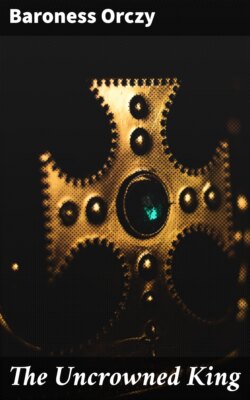Читать книгу The Uncrowned King - Baroness Orczy - Страница 10
На сайте Литреса книга снята с продажи.
3
ОглавлениеTable of Contents
The rain had turned to a regular hailstorm by now. Hailstones as big as peas were driven by the wind against the windows of the restaurant, making a noise like a volley of shrapnel. The wind howled down the chimney of the traditional iron stove that stood in the middle of the room.
Every time a customer went out by the swing doors, he had to cling to his hat and bend his head to the blast. The air that came rushing into the overheated room made everyone shiver and curse.
The young man in the far corner was sipping his coffee. The great man had not deigned to speak to him again. It was a way he had, had old Ingres, throwing a word of praise to a youngster as he would throw a bone to a dog, and leave it at that.
“Eh bien, Cyril, mon petit, ça va?” and then: “I rather liked that portrait.” That, from the great master, was more than he usually bestowed, and Cyril Bertrand, smoking his rank caporal, dwelt happily on the recollection of it all. A dog licking a succulent bone, so he thought of himself. His face lit up with a smile that was not altogether happy. Such a good-looking face it was! Pity he wore his hair so long and left his beard unkempt. But that was the fashion in Montmartre, a tidy head or a clipped beard would have been put down as intolerable coxcombry, and the consequences would have been almost disastrous to the wearer. Cyril’s hair and beard were of a wonderful warm chestnut colour, seldom met with in Northerners. Yes, he was a good-looking boy, was Cyril Bertrand, the aspiring portrait painter, whose work the great Ingres had “rather liked.” Women had told him before now that he was good-looking. They liked his eyes, which were dark, and always seemed to express—so they said—much more than other men’s words. They also liked his hands, which were singularly well shaped, and had a firm grip which sent pleasant thrills down one’s spine. But no one knew much about him. Nothing really. As far as anyone knew he had started life as a boy in Ingres’s studio, cleaning the great man’s palette at close of day, and washing his brushes. Presently he took a studio in the Cité du Réaumur and sent a picture to the Salon which was rejected. Nothing unusual in this. Greater men than he had begun their artistic career in this way. He earned a pittance by designing hats and dresses for one of the big emporiums on the Boulevard. Twice a year he sent a picture or two to the Salon, but these invariably came back to the studio, accompanied by the usual polite rejection slip: “The Committee regrets . . .”
But these recurrent failures did not affect Bertrand’s good temper. He was a gay, cheerful sort of fellow, who apparently did not ask much of life, or perhaps was content to wait for an opportunity. His sunny disposition made him popular in this shiftless, thriftless crowd of Bohemians: pleasantly boisterous in his cups, he was always ready for any prank, and could always be found in the thick of a row with the gendarmerie. The models adored him. Mimi, the cheeky little blonde known as the pocket Venus, declared that though M’sieu Bertrand was rather queer she would sooner sit to him than to any other artist. When he was in funds he would give you bonbons and flowers and a dinner at a restaurant, but when money was tight or work pressing—oh, la, la!—M’sieu Bertrand was just a slave-driver. As Mimi said, you never knew how to take him, he had such funny fads and fancies, such as his love for the English. Why? Mimi couldn’t say. Nor could anyone else. And lots of people and things he hated for no particular reason that one could see: the Bonapartes as a family, all the Bourbons and the whole of the royalist party; and if you happened to mention Spain or the Spaniards, why, he positively seemed to see red. But there, Mimi concluded and shrugged her pretty shoulders: “Que voulez-vous? Those artists! Oh, la, la!” She had had to do with them all her life. She was none the worse for their tantrums.
Of late, so Mimi and the other models declared, Cyril Bertrand had been more than usually “queer.” It couldn’t be that his head got turned through his recent success: that wasn’t M’sieu Bertrand’s way. And yet, it was funny. That was just the word. Funny. Ever since he had painted that portrait of Mademoiselle Christophe, and got a really big price for it. Ever since he had been patted on the back by the art critics who had seen the picture and been told by them that he was a coming man, Cyril Bertrand had been different. For one thing he was much more silent than he used to be. Silent at times. At others boisterously gay, but with a gaiety that always appeared forced. And if anyone spoke to him while he was at work, or during a meal, he would start and stare, as if he had been suddenly wakened out of a dream.
